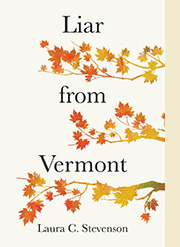A New Series: One Minute Reviews of
Books by Vermont Authors
Laura's column "One Minute Reviews" has appeared bi-weekly in Wilmington, Vermont's Deerfield Valley News since 2015. In April 2018, she found that no Vermont periodical consistently reviews all commercially published fiction and non-fiction by Vermont authors, so she started a series to fill that void. Published reviews from that series and some earlier reviews of local authors are listed with links to a scan of the printed copy. Reviews still in queue are listed without links until they appear in print.
The books reviewed in this series are available through Wilmington's Pettee Memorial Library, the Whitingham Free Public Library, and locally owned Bartleby's Books in Wilmington.
Deerfield Valley News, 2/7/2019
Debut collection of essays from a young writer celebrataing Vermont
Leath Tonino, The Animal One Thousand Miles Long: Seven Lengths of Vermont and Other Adventures. Trinity University Press, 2018.
The animal in the title is a creature Aristotle invented in The Poetics (7B) to demonstrate that an observer of a gigantic object could see only its parts, and thus lost perception of its "unity and wholeness." Tonino implicitly compares Vermont to this animal; his twenty essays, collected from periodicals published between 2011 and 2017, portray his adventures and observations in all parts of the state. Together, they also portray his impossible yearning to experience the whole by feeling "the infinite invitation that is the terrain of home."
Young and vigorous, Tonino is an enthusiastic adventurer. "Seven Lengths of Vermont," for example, opens with his vow, upon returning from several years "bumming around the West," to rediscover his native Vermont by touring it in seven different ways in the course of a year. The reader (presumably ensconced on a sofa) then becomes his vicarious companion as he hikes the length of the Long Trail, hitch-hikes around the state in over thirty rides; completes a three-week, 300-mile ski trek along the Catamount Trail; bikes through the state in a tour of some 500 miles; paddles 260 miles in a canoe trek along the Connecticut River; swims, in ten days, the length of Lake Champlain; and finally, climbs into a friend's small plane for a two-hour “vast and fast” flyover of the whole state. At the end of the year, Tonino has experienced parts of Vermont from many angles and at many different speeds in an attempt to understand the whole.
There are more parts, of course, and more ways to investigate them. In "The Smiles are Huge" Tonino goes jack-jumping, a winter sport practiced only in Vermont. Other portraits of his cold and exhausting winter adventures (biathlons, New Year's Day kayaking, sled-packing) prove that Vermont offers winter opportunities far beyond commercial skiing. Mingled with Tonino's delightfully ironic portrayals of his adventures are interesting considerations of Vermont's present wilderness (its official Wilderness areas) and its unofficial wildness, thousands of acres of trees that are the result of ecological collapse and subsequent regeneration. Between 1791 and the War of 1812, Tonino says, Vermont had the fastest growing population of any state in the union; a half-century later, its population had declined 40%. Why? Because the early settlers had clear-cut its virgin forest, raised sheep that overgrazed the resulting pastures, and abandoned it as the topsoil washed away. Tonino's essay "Seeing is an Art" portrays one of the first naturalists to recognize man's catastrophic effect on his landscape: Darwin's contemporary George Perkins Marsh, a distinguished resident of Woodstock. As a cautionary tale about this destruction, Tonino offers the nineteenth century town of Glastenbury (near Somerset), in which 21 brick kilns produced charcoal, each of them burning 50 cords of wood a day, and a sawmill turned out 1000 board feet an hour … until, with no more trees to hold mountain topsoil, the town disappeared after the "freshet" of 1898. Hiking to the town's location, Tonino found all signs of civilization covered by regrown forest—a "wilderness in recovery, the flow of wildness across time." Tonino's adventures encourage Vermont natives and visitors to look at the wildness about them, instead of assuming that wilderness can be found only in the West. Provided that they heed George Perkins Marsh's observation that "sight is a faculty; seeing, an art," they will develop a deep appreciation for the varied and beautiful wild parts of the animal a thousand miles long.


